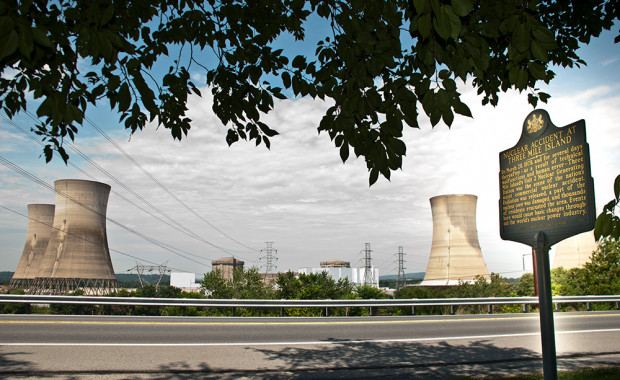Lawmakers mull support for nuclear industry
-
Marie Cusick
State lawmakers have begun discussing ways to shore up Pennsylvania’s struggling nuclear power industry, while maintaining a reliable electric grid and low prices for consumers.
That was the focus of a meeting Wednesday of the new, bipartisn Nuclear Energy Caucus. As the drilling boom continues to flood the market with cheap gas and electricity demand has slowed, the nuclear industry is having trouble keeping up. Last year the Three Mile Island plant near Harrisburg didn’t clear an auction for the future sale of its electricity raising concerns it could shut down prematurely
The caucus is widely expected to push for some kind of legislation later this year to secure the future of Pennsylvania’s nuclear fleet. The state’s five plants produce about a third of its electricity.
During the caucus’ second meeting Wednesday, legislators heard from the PJM Interconnection– the regional transmission organization that coordinates the movement of wholesale electricity for 13 states and Washington D.C.
Recent legislation in Illinois and New York has helped prop up the nuclear industry through zero emission credits. However those programs have been challenged in court by competing power producers, who argue they interfere with competitive electricity markets. A Pennsylvania coalition recently formed to oppose a similar move by Harrisburg. Citizens Against Nuclear Bailouts has 17 members so far, including the natural gas trade group, the Marcellus Shale Coalition, Pennsylvania Manufacturers’ Association, Pennsylvania Chemical Industry Council and the AARP.
Stu Bresler, PJM’s Senior Vice President Operations and Markets, says any kind of external subsidy can disrupt a competitive marketplace. He adds PJM doesn’t want to tell the states what to do, but rather, it wants to help them achieve their goals.
“If their objective is to maintain zero-emission resources, then the most effective way to do that is to put a price on carbon. Realistically, that’s not going to happen on a national level,” says Bresler. “But there’s no reason why a certain set of states in the PJM region couldn’t get together and say, ‘This is what we want to do.’”
Rep. John Maher (R- Allegheny) says he has more questions than answers at this point, but believes PJM is making decisions on a relatively short timeframe. Its annual capacity auction has entrants bid to set prices three years in the future.
“In my life, a three-year horizon is a snap of the fingers,” says Maher. “Who would have expected 10 years ago what’s happened with natural gas in Pennsylvania? Nobody. In terms of having major sources of supply permanently decommissioned—that may be the right answer in the long term. Or it could be setting us up for unreliable power.”
Davitt Woodwell, president of the Pennsylvania Environmental Council, attended the meeting and says his group is supportive of having nuclear power remain part of Pennsylvania’s energy mix, as part of long-term efforts to combat climate change.
“If you’re replacing coal with gas, it’s a benefit,” he says. “If you’re replacing nuclear with gas, it’s a detriment.”
He adds it will be difficult to figure out how best to support the nuclear industry.
“Other states have looked at this and figured out their solutions. Are those right for Pennsylvania? There will be a lot different interests coming down hard on all sides of this,” says Woodwell. “The devil will truly be in the in details.”
Environmental groups are closely monitoring how things are unfolding in Harrisburg. For example in New York, the nuclear subsidies came along with a major expansion of the state’s clean power goals, which are now aimed at reaching 50 percent renewables by 2030. By contrast, Pennsylvania sets an 8 percent renewable standard for 2021.
Jackson Morris, of the Natural Resources Defense Council, says there should be a broader aim– to promote truly clean energy sources.
“The discussion in Harrisburg needs to focus on how to tap the massive job creation from energy efficiency, wind, and solar,” he says. “Looking at this based on what is and isn’t good for Pennsylvania’s nuclear fleet misses the big opportunity before us.”

















